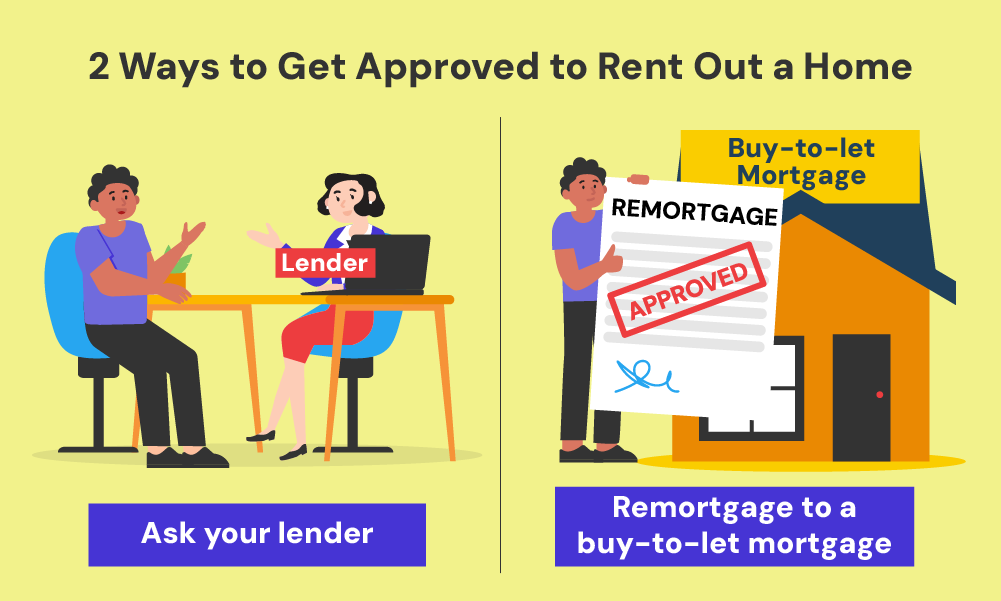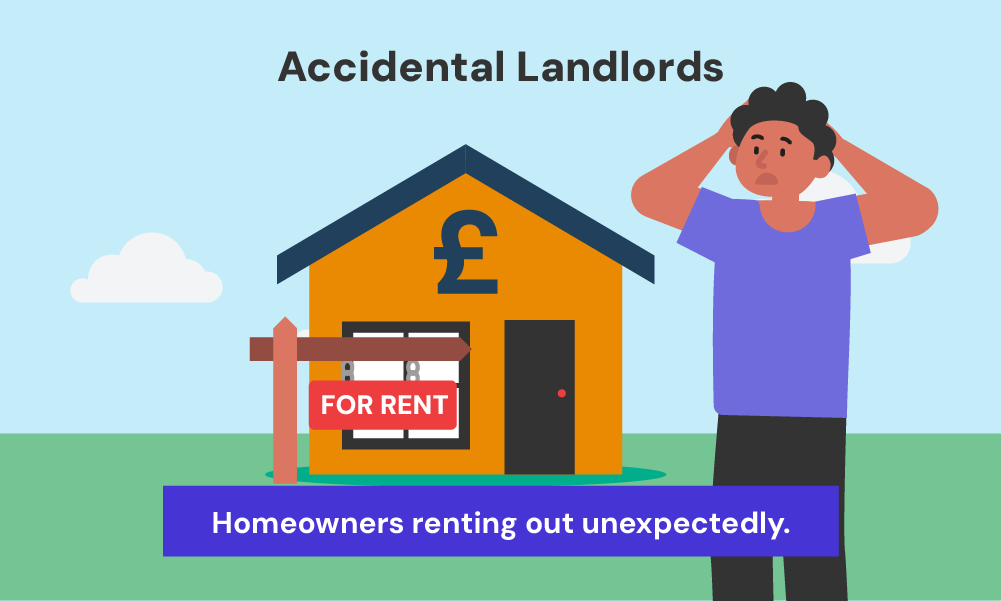- Is It Legal to Rent Out My House in Secret?
- What Are the Risks of Renting Without Permission?
- Do I Really Need to Tell My Lender if I Want to Rent?
- How Can I Get Approved to Rent Out My Home?
- What If I’ve Already Started Renting in Secret?
- How to Make the Switch to a Buy-to-Let Mortgage
- Other Lender Requirements for Rentals
- Rules for Accidental Landlords
- Other Potential Pitfalls of Secret Rentals
- The Bottom Line: Being Upfront Gives You Options
Can I Rent Out My House Secretly In The UK?

Most homeowners in the UK have been there – you need some income or want to move cities temporarily for work.
We get it.
The thought of renting out your current property to cover costs seems like a smart solution. But can you really do that without notifying your mortgage provider?
The short answer is no, and here’s why.
Is It Legal to Rent Out My House in Secret?
While it’s not technically illegal, renting your house without your mortgage lender’s approval is a big NO-NO. This is because you’re breaking the rules you agreed to when you got the mortgage.
Most mortgage contracts in the UK clearly state that you can’t sublet or rent out the property without written permission from the lender.
What Are the Risks of Renting Without Permission?
The consequences of secretly renting out your mortgaged home can be quite severe.
If your lender finds out, they can call in the entire loan immediately, forcing you to repay everything at once. This could lead to foreclosure if you can’t come up with the money.
They might also sue you for breaching the contract, leaving you with penalties, fees, and potentially even higher mortgage rates in the future.
Do I Really Need to Tell My Lender if I Want to Rent?
Yes, you absolutely must notify and get approval from your mortgage lender before renting out your mortgaged property, even if it is just for a short period.
The mortgage contract terms are not just polite suggestions – they are LEGALLY binding requirements you agreed to.
But Won’t My Lender Just Say No if I Ask?
You might think asking your lender is pointless, but most these days are open to considering rental requests if you go through the proper process.
Homeowners often worry they’ll get an automatic “no,” but that’s usually not the case.
How Can I Get Approved to Rent Out My Home?
The first step is simply being upfront with your lender about your intentions to rent out the property. Clearly explain your reasons and situation.
Lenders understand that temporary job relocation, inherited properties, and other unforeseen circumstances may require you to rent.
Typically, the lender will require you to switch from a standard residential mortgage to a Buy-to-Let mortgage product.
This will involve credit checks, income verification, and providing estimated rental income figures to demonstrate you can cover the new mortgage payments, usually with a 25% surplus.

What If I’ve Already Started Renting in Secret?
If you have already started renting out your property without lender approval, you need to immediately inform the mortgage company and seek permission retroactively. The sooner you come clean, the better.
Continuing to rent illegally once the lender is aware is a surefire way to get your mortgage revoked.
But if you are upfront, many providers will still allow you to switch to a Buy-to-Let product as long as you meet the requirements.
How to Make the Switch to a Buy-to-Let Mortgage
If your lender agrees to let you rent out your current property, they will likely require you to switch from a residential to a Buy-to-Let or investment property mortgage.
This process usually involves:
- Passing rental income requirements (usually 125%+ of new mortgage payments)
- Having 25%+ equity in the property
- Minimum credit score requirements
- Possibly higher fees, interest rates, and deposits
- Minimum income and age requirements
The rental property will also be reassessed on its rental value, which can be lower than the original purchase price valuation you received.
It’s wise to plan ahead and calculate whether your potential rental income can realistically cover the new Buy-to-Let mortgage payments and associated costs of becoming a landlord.
You can try the calculator below to see an estimate of how much you can borrow for a buy-to-let mortgage.
[Embedded Buy to let mortgage calculator]
Other Lender Requirements for Rentals
Even if your income and credit score are good, your lender might have other hoops to jump through before you rent out your mortgaged home. These could include:
- Living there for a while first (usually 6 to 12 months).
- Making sure the property is in good shape for tenants.
- Getting a special accredited landlord certification in some cases.
Lenders want to make sure you’re prepared to be a landlord and that you’re genuinely planning to rent, not just speculating on the property market.
Rules for Accidental Landlords
Accidental landlords are homeowners who rent out their property unexpectedly. You might be in one of these circumstances:
- Needing to relocate temporarily for work
- Moving in with a partner who owns another home
- Inheriting a second property
While lenders might be more flexible in these situations, you always need their written go-ahead before renting.
Each lender has its own accidental landlord policy, so be sure to check the specifics.

Other Potential Pitfalls of Secret Rentals
Besides violating your mortgage terms, renting out your home without the lender’s approval can lead to further issues:
– Your home insurance will be invalid, leaving you unprotected
– You won’t have the proper landlord insurance coverage
– Your rental income could be considered untaxed profit
– You may violate lease terms if you rent out a mortgaged leasehold property
So in most cases, even if your lender does allow rentals, carrying on in secret is NEVER worth the legal and financial risks involved.
The Bottom Line: Being Upfront Gives You Options
Be upfront with your mortgage lender from the beginning if you want to rent out your house. Trying to hide it breaks the terms of your mortgage and could land you in hot water.
Instead, your lender can help you find a solution that works for both of you. This could involve:
- Switching to a buy-to-let mortgage for long-term rentals.
- Getting permission to rent for a short period.
- Keeping your current mortgage if it’s just a temporary situation.
There might be extra fees involved, but being transparent with your lender avoids penalties, lawsuits, and financial trouble later.
The bottom line: Renting out your home is possible, but doing it sneakily is a BIG risk. Talk to your lender about your plans – they’re there to help you navigate the process smoothly.
If you’re unsure where to start, a mortgage broker can be a big help in this situation. They can explain your options and connect you with lenders who are open to approving rentals.
Need a broker? Reach out to us. We’ll connect you with a qualified mortgage broker who can help you solve your mortgage situation without being stressed.
Get Matched With Your Dream Mortgage Advisor...

Frequently asked questions
Will the bank find out if I rent my house?
Yes, the bank is likely to find out if you rent your house. This could happen through insurance changes, council records, or if tenants seek permissions for housing benefits.
It’s important to check your mortgage agreement, as most lenders require you to get consent before renting out your property.
Do I need to tell my mortgage company if I sell my house in the UK?
Yes, you must inform your mortgage company if you plan to sell your house.
The mortgage needs to be paid off or transferred as part of the property sale process. Your solicitor will typically handle this with your lender when you sell your home.
I'm going to rent out the house I live in. Does my mortgage holder care?
Yes, your mortgage holder does care if you plan to rent out your house. Most residential mortgages require the property to be owner-occupied.
If you want to rent out your home, you may need to switch to a buy-to-let mortgage or obtain permission from your lender to let your property.




